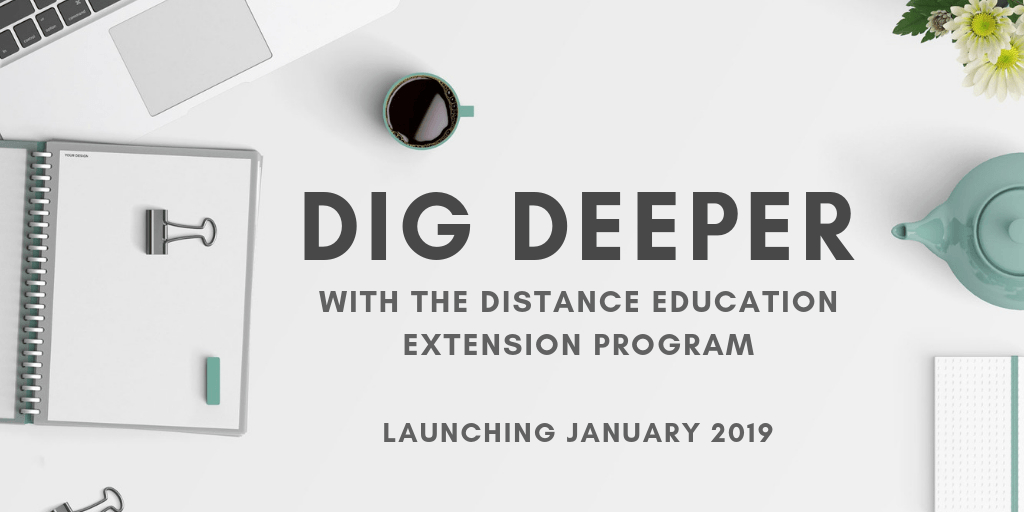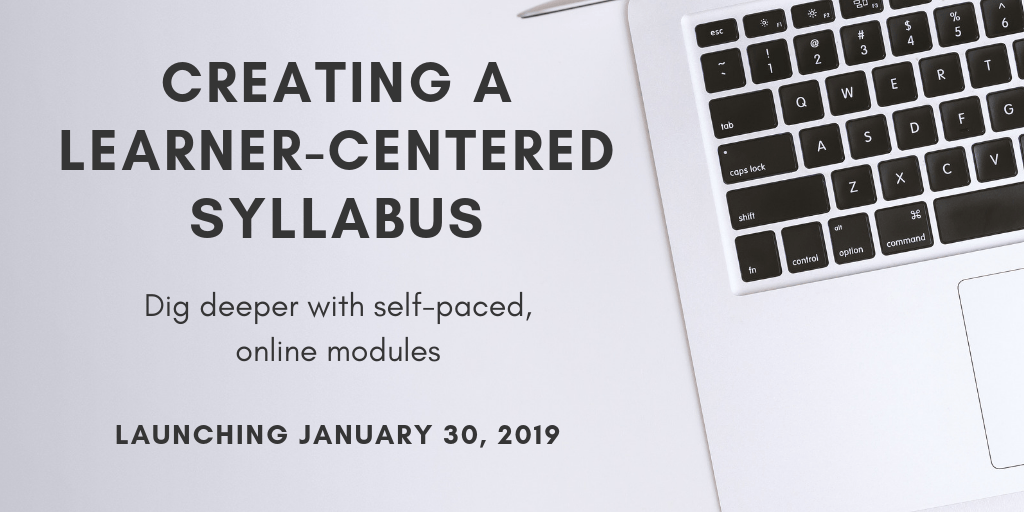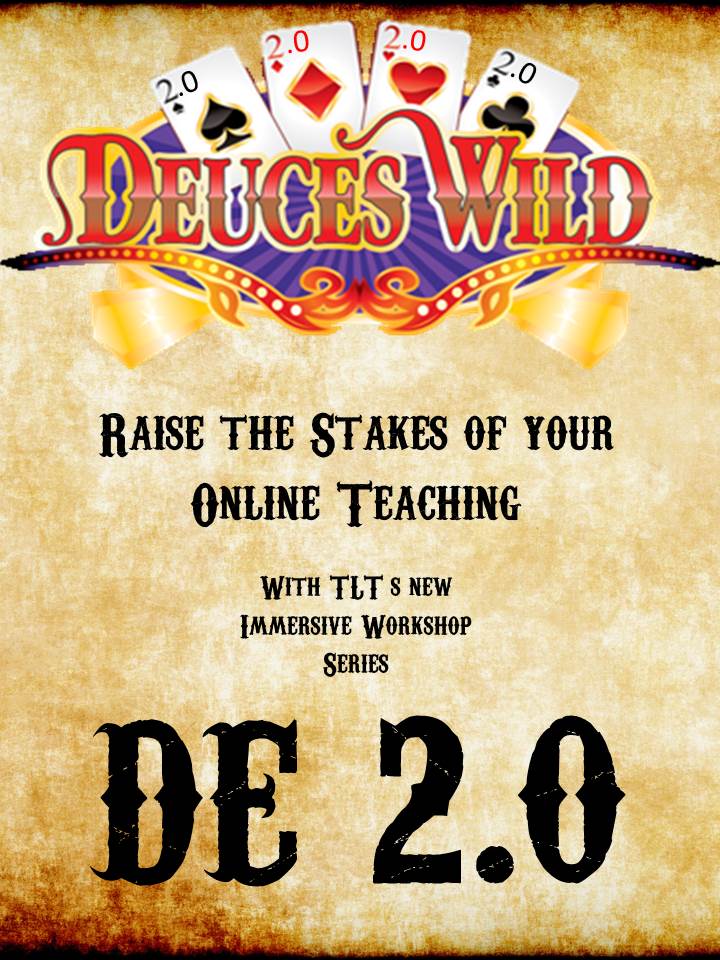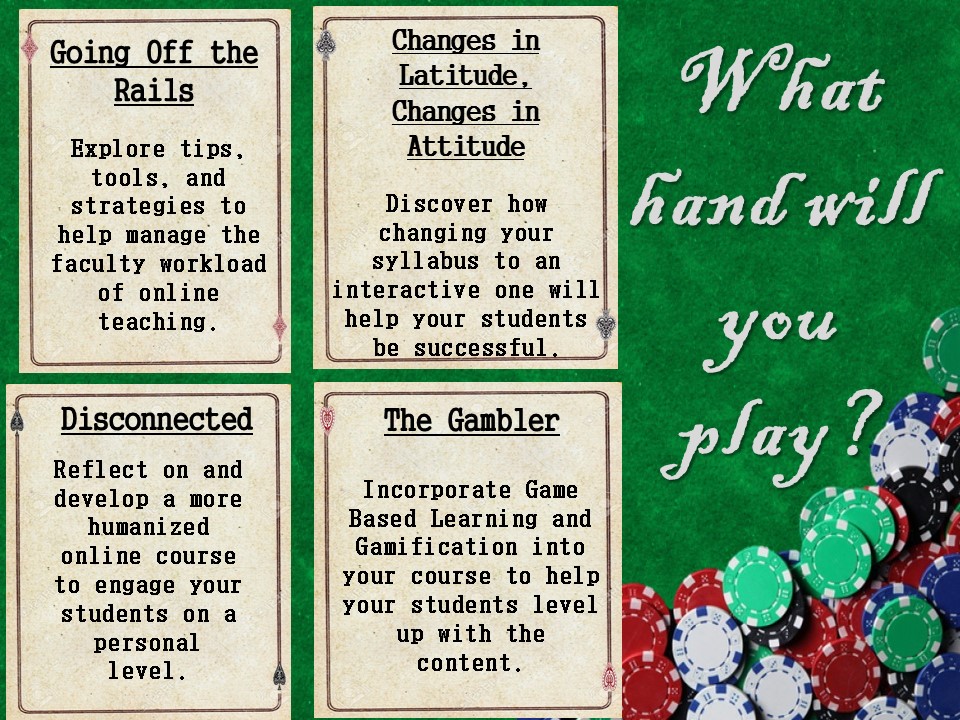Tag: training
Dig Deeper into Online Teaching and Learning!
Your Teaching & Learning Team is excited to announce a new professional development opportunity you won’t want to miss. On January 30, 2019, we will launch the Distance Education Extension Program (DEEP for short). This will be a series of online, self-paced mini-courses for faculty who are teaching online and hybrid classes. While the Distance Education Readiness Course provides an introductory survey of pedagogical best practices, DEEP courses will focus on specific themes, allowing faculty to dig deeper into scholarship and praxis.
Online, Self-Paced, and On-Demand
The best part is DEEP courses are on-demand and self-paced. Facilitated via OAKS, you can participate on your own schedule. Spend a week or spend an entire semester. There are no synchronous elements, required assignments, or grades. You can use the information presented to completely overhaul your teaching practices or you can use a single suggestion to make a small change. However you use these courses is up to you.
To reward you for experimenting with new ideas, you have the option to earn a digital badge for each DEEP course you complete. Completion is determined by consuming all course content and submitting reflection exercises that demonstrate what you’ve learned. These badges can be added to your email signature, website, blog, or even your tenure and promotion materials.
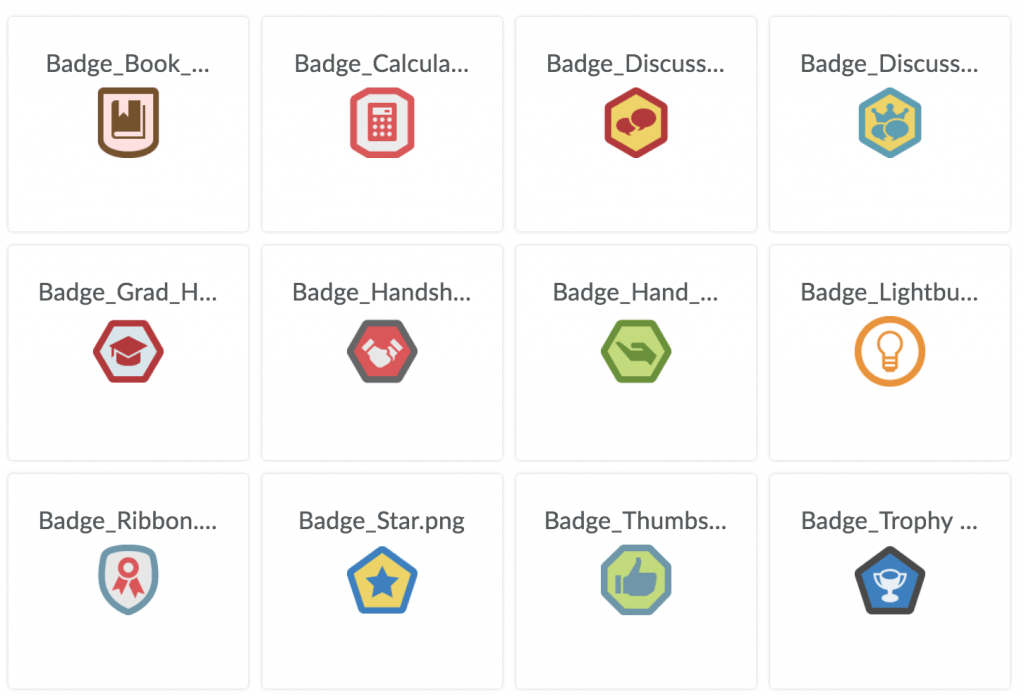
On January 30, 2019, two DEEP courses will launch: “Cultivating a Community of Inquiry” and “Creating a Learner-Centered Syllabus.” Over the summer and into the future, additional courses will become available.
Cultivating a Community of Inquiry
What is “presence” in the context of teaching and learning? As an instructor, you might think of presence as being mindful of the course climate and intentionally fostering a community of learners. One of the strongest factors impacting student retention in online courses is feeling a sense of community as opposed to learning in isolation. Thus, cultivating community your online course makes a huge impact on student learning, engagement, and overall success. So, how do we accomplish this?
One approach is to apply the Community of Inquiry framework. This model describes the interplay between three elements—teaching presence, social presence, and cognitive presence. These types of presence are essential to develop deep and meaningful educational experiences in online learning environments. This course will address these three elements from theoretical and practical perspectives. You will be provided with an overview of the research and get the opportunity to explore practical strategies that can be incorporated into your own classes. Depending on what you create in response to the reflection exercises, this course will take most people 6 – 8 hours to complete. But, what you create and how much time you spend is completely up to you!
Creating a Learner-Centered Syllabus
What functions do syllabi serve? Common functions faculty cite include serving as a contract, listing required textbooks, detailing policies and procedures, and describing the focus of the course. Less commonly, professors note that the syllabus describes their teaching philosophy, lists resources available to help students succeed, and explains how their course fits into a discipline or broader context.
One important role a syllabus plays that is frequently overlooked by professors is that it sets the tone for the rest of the semester. The syllabus is the initial point of interaction between you and your students and it can create powerful first impressions. Through content, tone, and format, does your syllabus come across as welcoming, conversational, and aesthetically-pleasing? Or, does it seem cold, dictatorial, even infantilizing? Be honest — if you were a student, would you want to read your syllabus?
Based on one of TLT’s most popular workshops, this course will provide an overview of the research on learner-centered syllabi, share best practices in syllabus design, and suggest non-traditional methods of presenting this essential document. Depending on what you create in response to the reflection exercises, this course will take most people 4 – 6 hours to complete. If you are creating a syllabus from scratch, it could take longer. But, what you create and how much time you spend is completely up to you!
How Do I Sign Up?
No application or sign-up is required. These courses are “on-demand” within OAKS and available to anyone who has already graduated from the Distance Education Readiness Course. After January 30th, you can simply search for the courses on the OAKS homepage and access them whenever you like:
- Log into OAKS
- Click on the waffle icon in the top menu bar near your notifications and name
- In the search box, type either: Cultivating a Community of Inquiry or Learner Centered Syllabus
- Click the magnifying glass to search
- Click the name of the course that comes up in the results list.
- If you have any trouble accessing the course, please email Jessica at smithjt@cofc.edu
Haven’t taken the DE Readiness Course yet? We encourage you to chat with your department chair about whether online teaching is right for you and for your department. We offer the 7-week, online preparatory course three times per year. Visit the distance education webpage for more information.
Have questions about the Distance Education Extension Program or suggestions for future courses? Please reach out to Jessica at smithjt@cofc.edu
DE 2.0 Workshop: Humanizing Your Online Course

“I miss getting to really know my students. It’s just not the same.”
“There’s no way of knowing who is on the other side of the screen.”
Sound familiar? If so then you aren’t alone.
Not only do some instructors feel this way about online learning, but students do as well. Often they feel isolated, disconnected, and insignificant. These feelings of seclusion can often lead to decreased motivation, attention, and engagement. As part of the online learning process, it is vital to intentionally design elements to make sure that that the human connection isn’t lost in the online learning process.
What is Humanizing?
Humanizing your course involves considering the teaching presence, social presence, and cognitive presence of all participants in order to build community and enhance communication. The ultimate goal of this process is to make online education as personal and individualized as possible while building relationships between your students, the content, and yourself.
About the DE 2.0 Workshop
This 3-week long, self-paced session will take you through some strategies that you can use in your online class to make you and your students feel more connected. While this course is held fully online, it does contain three optional synchronous sessions with experts in humanizing online education from around the world!
You might be interested in this session if:
- You feel you are not connecting with your students in your online class the way you do in your face-to-face class.
- You feel like your online class lacks community.
- You want to make your course more engaging and personal for the students.
Workshop Goals
- Discover the elements of teaching presence, social presence, and cognitive presence as it applies to the online learning environment, particularly in the areas of facilitation, learning domains, and course design.
- Research assessment and engagement strategies, community building/maintaining platforms, and technology tools for increasing the humanized element.
- Discuss elements of humanized learning with other faculty teaching online at College of Charleston.
- Ask questions, exchange ideas, and meet other CofC faculty teaching distance education courses.
- Create engaging content and online activities that foster the elements of teaching presence, social presence and cognitive presence.
Learning Outcomes
- Explore instructional theories that lead to a more humanized online class.
- Identify areas of your course that can be made learner centered and/or interactive.
- Revise and/or create course interactions, including social learning experiences, content delivery methods, and assessment of student learning.
Register now on TLT’s DE Readiness Blog!
Applications are open until January 31, 2017!
Wanted! CofC DE Instructors Interested in Professional Development
TLT is proud to announce the start of a new training opportunity for online faculty!
Fall Application Deadline for DE Readiness Course
Teaching, Learning, & Technology is accepting applications for the Fall 2015 DE Readiness Course. Applications are due May 1, 2015.
In order to teach online for the College of Charleston, faculty must complete this 8-week online course which will run from September 16 to November 18.
The course guides faculty through best practices and technology tools in online education. Participants will progress through seven modules that examine course planning and design, content delivery, community formation, communication, and assessment. Every participant will create content that can be integrated into their future online courses and will receive feedback and guidance from fellow participants and faculty mentors.
To learn more about what to expect from the DE Readiness Course, please visit: blogs.cofc.edu/tlt/learning/distance-education/ This video will also provide an overview of the course:
To apply, please click here: blogs.cofc.edu/tlt/learning/distance-education/distance-education-de-readiness-course-application/
Come See What’s New at TLT!
On a college campus, each semester offers the opportunity to start fresh. We meet new people, teach new classes, start new research projects, and discover new places that make Charleston such an amazing city. At TLT, we’ve spent the summer crafting exciting trainings, events, and resources that we are eager to debut to our faculty!
Webinar Wednesdays
TLT is excited to announce a new opportunity for College of Charleston faculty: Webinar Wednesdays! We understand that you are very busy during the semester, and sometimes you simply cannot leave your office. Your crazy schedule makes it a challenge to attend events or trainings on campus. Webinar Wednesdays makes it possible to attend TLT training sessions from the convenience and comfort of your home or office. All you need is a computer with an Internet connection and a headset! If you do not have a headset, you may call a specific phone number to access the webinar. All this information will be provided to you in advance. During the webinar, an instructional technologist from TLT will lead you through a virtual training session – you will be able to hear us, see what we are doing on our computers, and ask questions.
Our upcoming sessions include iMovie on the iPad, OAKS Quizzes, Twitter, and Explain Everything (iPad app)! We will continue to offer innovative and useful sessions throughout the semester. And let us know if you have any requests for topics.
Be sure to register for a webinar at tlt.eventbrite.com.
Innovative Technology Trainings
Did you know that TLT offers numerous face-to-face small group trainings every day? Not only do we cover OAKS tools and Google Apps for Education, we also lead sessions on a variety of iPad apps and Web 2.0 technologies. Here are a few sessions that may pique your interest:
Augmented Reality in the Classroom:
This session explores two augmented reality applications for the iPad: Aurasma and Layar. Augmented reality involves viewing a real-world environment whose elements are supplemented by computer-generated input such as sound, video, graphics, or GPS data. Augmented reality can make static entities such as poster sessions or pictures more interactive.
Animate Your Presentations with PowToon:
 PowToon is an online tool that allows you to create dynamic slideshows. It allows users to make lectures and presentations more unique, fun, and engaging. PowToon offers a simple dashboard with a vast number of options to customize and animate your slides.
PowToon is an online tool that allows you to create dynamic slideshows. It allows users to make lectures and presentations more unique, fun, and engaging. PowToon offers a simple dashboard with a vast number of options to customize and animate your slides.
Spice Up Your Lectures with Prezi:
Have you grown tired of the predictability of Power Point? Looking for something more lively? Prezi could be just what you’re looking for! Prezi is the zooming presentation aid that allows for a dynamic and non-linear sequence of information. Prezi not only can be used to revitalize your lectures but can also be used collaboratively, making it ideal for student projects.
For the Tech Masters:
TLT does not simply offer introductory sessions for those first learning about a tool. We also offer more advanced sessions for those who already use an application and want to take their skills to the next level. Look for advanced sessions on tools such as Google Docs, Twitter, iMovie, and Evernote.
This is just a sampling of our upcoming training sessions. We add to the list often, so make checking tlt.eventbrite.com a habit! And if you don’t see a topic or tool you’re looking for, let us know!
Connect With Us Via Social Media
In addition to small group trainings, TLT provides faculty with a huge repository of resources through our blog and social networking sites. Each week, we update our blog with new tutorials, which provide step-by-step instructions on how to use a variety of applications and tools. These are fantastic resources whether you are learning a tool for the first time or need a refresher. Check out our offerings at: blogs.cofc.edu/tlttutorials.
We also share resources via social media. If you’re interested in staying abreast of our upcoming events and newest trainings, definitely follow us on Twitter and Facebook. If you’d like to see videos, blog posts, and infographics from other innovative educators, check out our Pinterest page. And if you want to watch tutorials, we have plenty on our YouTube channel. Stay in the loop and follow us!
Twitter: twitter.com/TLTcofc
Facebook: facebook.com/CollegeofCharlestonTLT
Pinterest: pinterest.com/tltcofc
YouTube: youtube.com/user/teachandlearn1
As much as we love sharing resources, we don’t want these social media sites to simply be a place for us to post and you to consume. We’d love to interact with you! If you’ve used a technology tool and want to share your experiences, consider posting to our Facebook wall. If you come across a cool article or resource, send us a tweet or a pin. Join us in making these sites collaborative virtual communities!
TLT’s New Toys!
Over the summer, your instructional technologists were busy playing with a few new toys, such as a MakerBot 3-D printer! We’ve been designing and printing a variety of awesome objects including a miniature model of the Great Pyramid of Egypt, an ethanol molecule, and a Mammoth skeleton!
We also purchased a green screen and lighting set to be used for photography and filming. If you’re interested in using our equipment, contact your instructional technologist.
Finally, we hung two 4K monitors on our wall to showcase upcoming events, trainings, and a slideshow from our most recent Faculty Technology Institute!
Please stop by TLT to check out what’s new!


